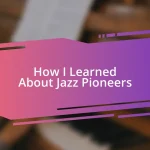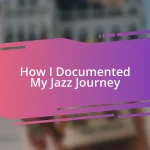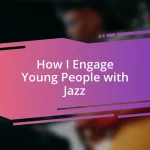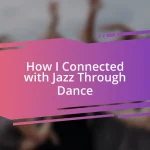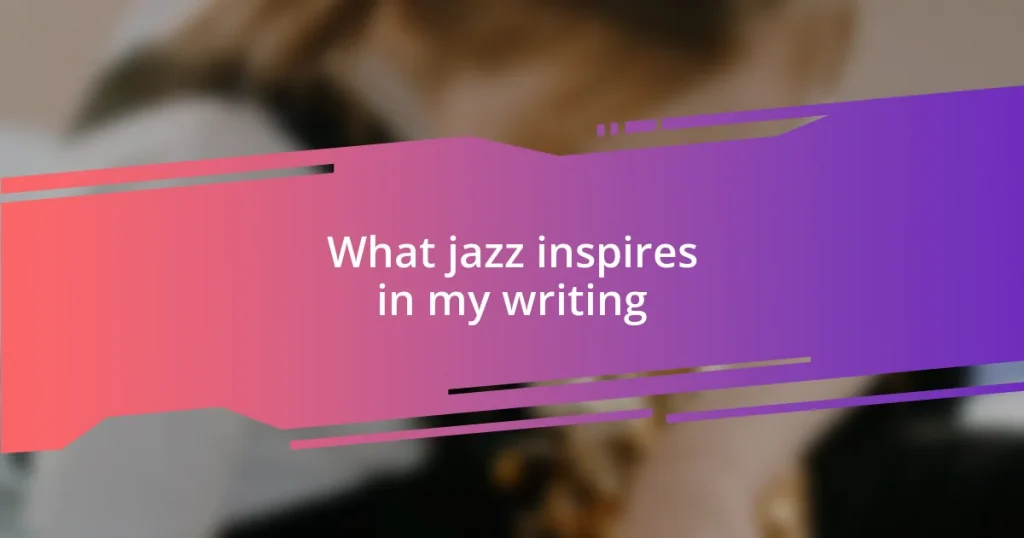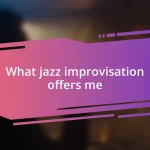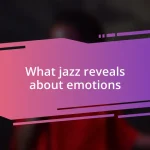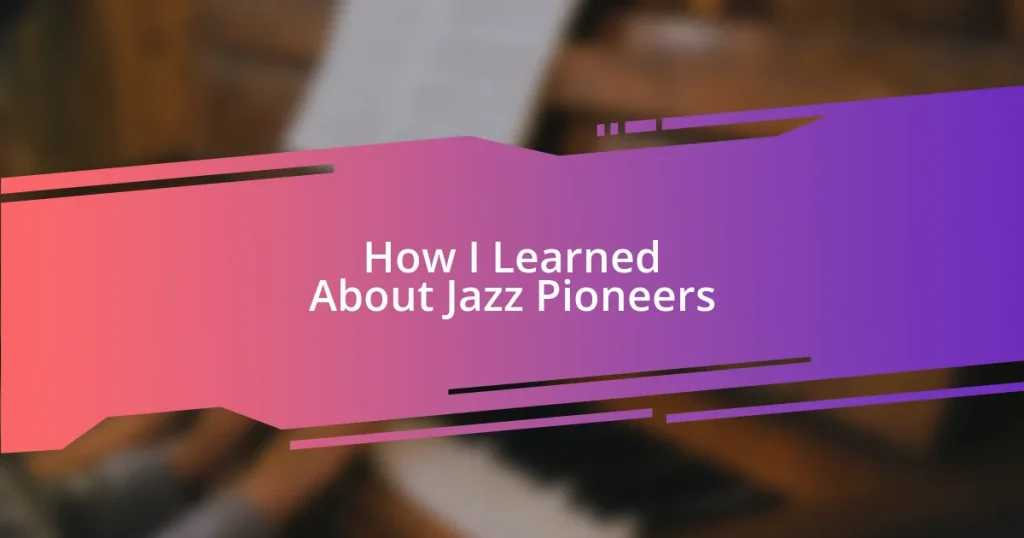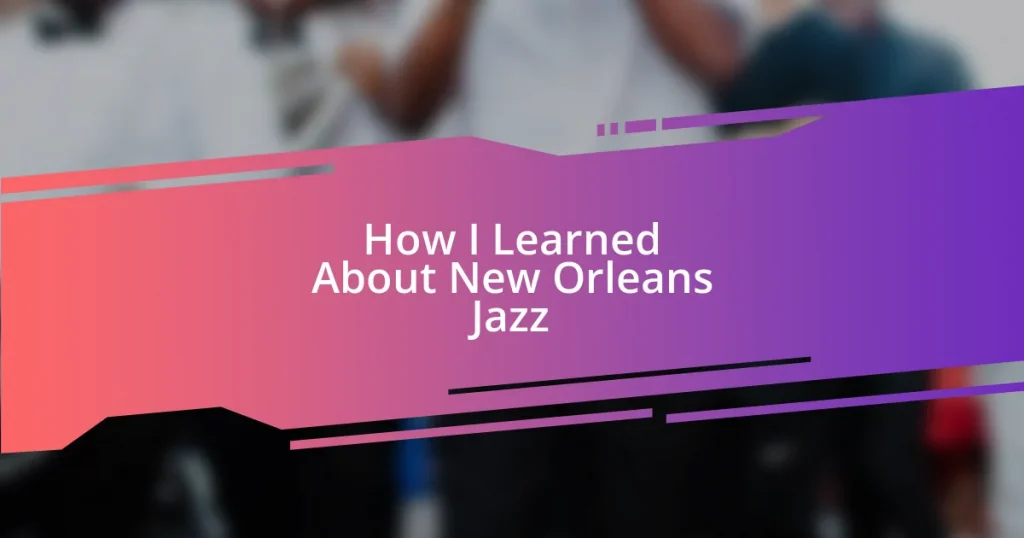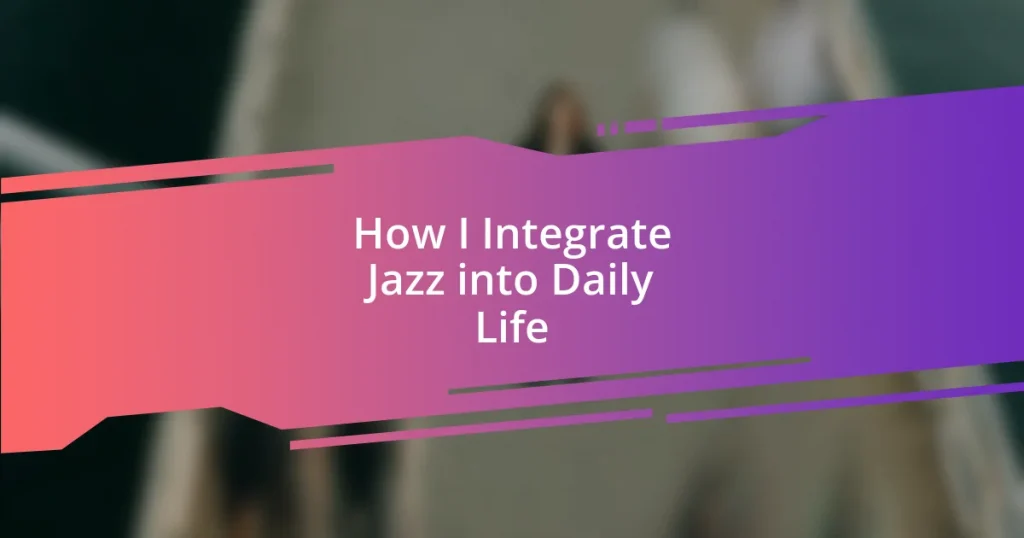Key takeaways:
- Jazz’s improvisational nature inspires spontaneity in writing, allowing for a deeper emotional connection and creative flow.
- Listening to jazz evokes various emotions, enhancing the imagery and narrative quality in writing through personal experiences and memories.
- Engaging with jazz through writing prompts and exercises fosters creativity and helps capture the essence of music in literature, leading to richer storytelling.
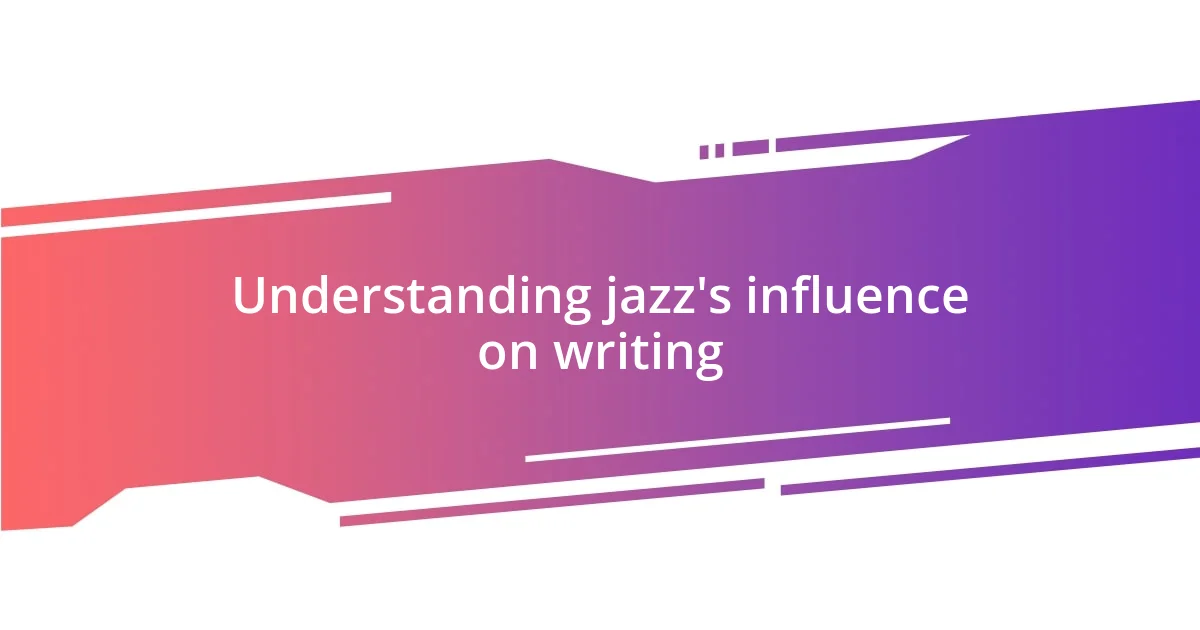
Understanding jazz’s influence on writing
Jazz, with its improvisational essence, deeply influences my writing style. I often find myself tapping into that spontaneous energy, letting my words flow freely much like a saxophonist pouring their soul into a solo. It raises the question: how can we allow our writing to breathe and evolve like a jazz performance?
When I write while listening to jazz, I notice how the rhythms and melodies shape my thoughts. The syncopated beats remind me of the ebb and flow of ideas—sometimes darting unexpectedly, sometimes lingering on a particular phrase. This interplay of structure and freedom captivates me; isn’t it fascinating how the unpredictability of jazz can mirror the unpredictability of our creative process?
One personal experience sticks out; I once wrote an entire poem during a late-night jazz session at a small club, inspired by the musicians’ raw energy. As I scribbled down my thoughts, I realized that jazz had unlocked something within me—an emotional depth that transformed a simple piece into a vivid tapestry of feelings. It makes me wonder, how often are we inspired to express ourselves in ways we never thought possible, simply by immersing ourselves in a different rhythm?
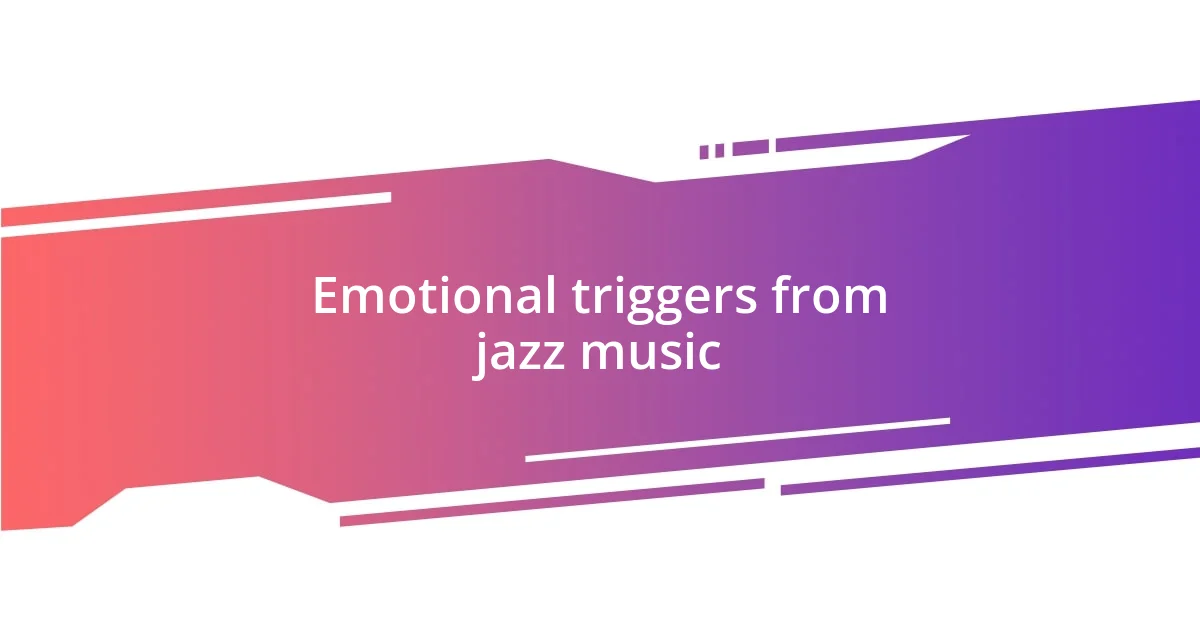
Emotional triggers from jazz music
Jazz music stirs emotions within me, often serving as a powerful backdrop for my writing. I remember one evening when I stumbled upon a small jazz café. The moment the trumpet burst into a soulful riff, I felt a surge of nostalgia. It was as if the notes were pulling memories from the depths of my heart, shaping my words as I scribbled scenes steeped in bittersweet recollection. Isn’t it amazing how music can evoke such vivid imagery?
Each note and chord can trigger different emotional responses for me. Listening to a smooth ballad can fill me with longing, while an upbeat tempo ignites an urge to explore new ideas. I often find myself immersed in a swirl of emotions, translating them into prose or poetry that echoes the rhythms I’m hearing. This connection between jazz and writing makes me ponder: how does the emotional landscape of music mirror the landscapes we create with our words?
Moreover, there’s something special about the way jazz improvises. I recall a time when I faced writer’s block; I consulted my jazz records, hoping to find a spark. As I let the music envelop me, I felt the same freedom that jazz musicians experience during a performance. It allowed me to release my inhibitions and write with a wild abandon that I desperately needed. Have you ever tapped into a rhythm that set your creativity on fire? For me, jazz serves as that catalyst, connecting the threads of emotion with the fabric of my writing.
| Jazz Emotion | Writing Reflection |
|---|---|
| Nostalgia | Creates vivid scenes rooted in past experiences. |
| Longing | Inspires poetic expressions of desire and hope. |
| Freedom | Encourages improvisation and spontaneity in writing style. |
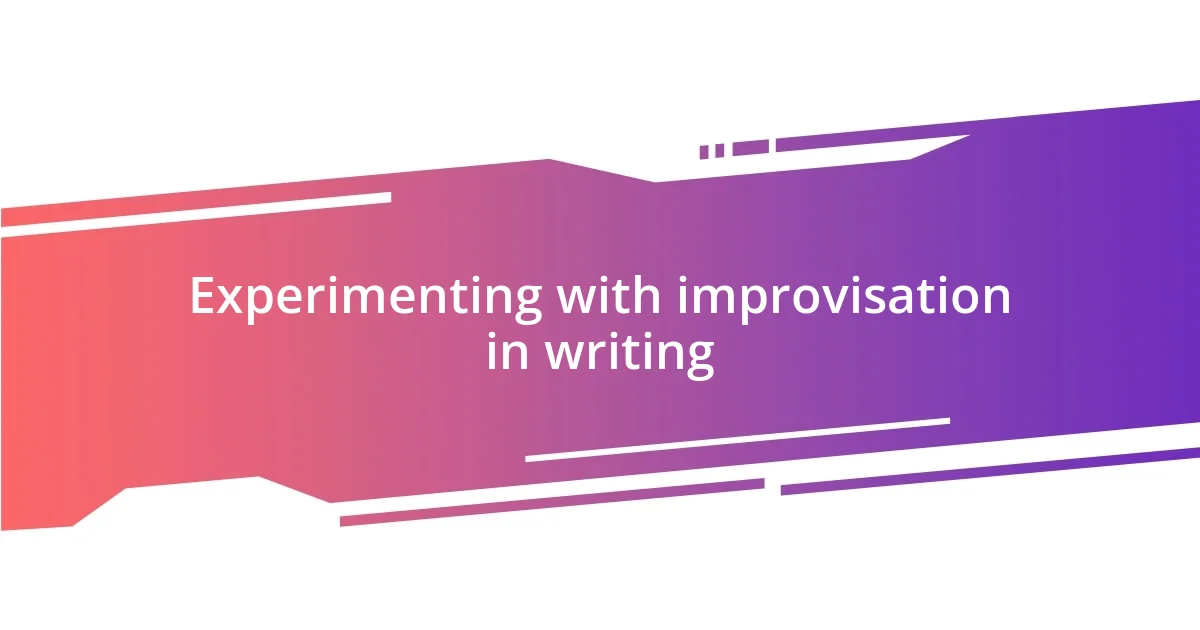
Experimenting with improvisation in writing
Jazz encourages me to let go of rigid frameworks and embrace improvisation in my writing. I remember one twilight evening, perched at my desk, a live jazz stream playing in the background. I started writing without a plan, permitting my thoughts to eb and flow like a saxophone’s notes. The result was unexpected; it unfurled into a narrative I didn’t know I had inside me. This exploration reminds me: what if we approach our writing with the same freedom as a jazz soloist?
When I lean into this improvisational spirit, I often jot down random phrases or images inspired by the music. Here are some ways I’ve found this approach beneficial:
– Unpredictability sparks creativity: Letting my ideas take unexpected turns often leads to richer narratives.
– Emotional resonance: Just like a jazz tune can evoke deep feelings, spontaneous writing can tap into emotions I didn’t realize were there.
– Flow and rhythm: I focus on the cadence of words, shaping sentences that dance on the page.
– Authenticity: Writing in the moment helps me find my true voice, unfiltered and genuine.
Allowing jazz to guide my writing reminds me that creativity thrives on spontaneity. It brings an exhilarating unpredictability that transforms not just the words on the page, but also my connection to the craft.
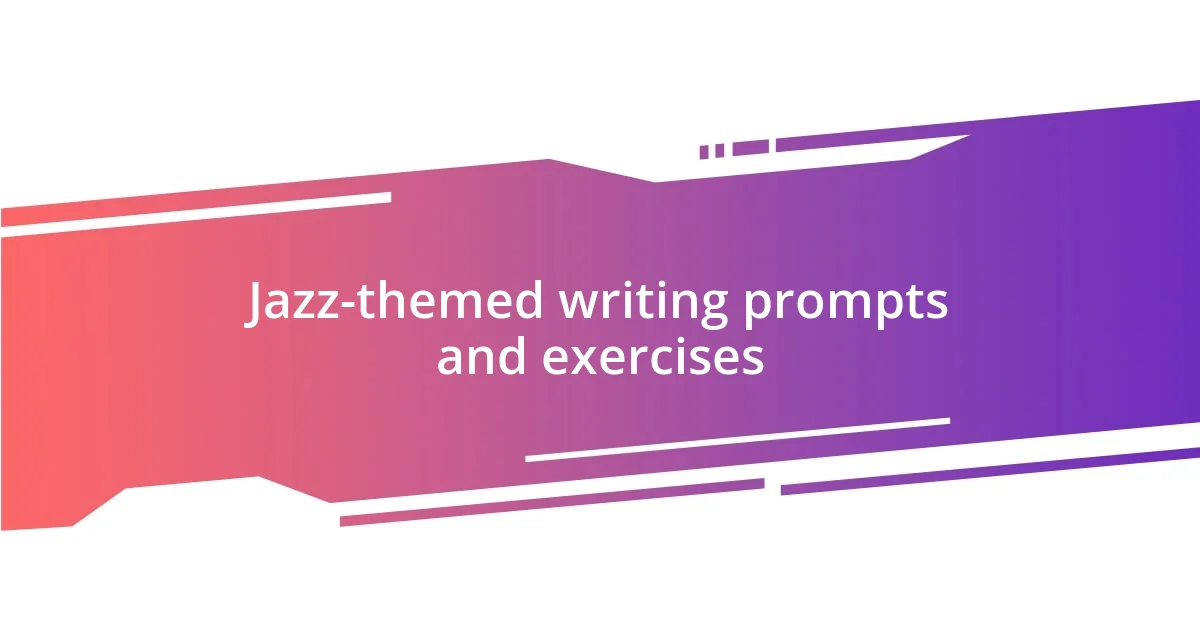
Jazz-themed writing prompts and exercises
One exercise I often embrace is writing a short story based on a specific jazz piece. For instance, I’ll play a lively bebop track and let my imagination ride the rhythms. As that saxophone squeals and the bassline dances, I find myself envisioning scenes filled with vibrant characters and unexpected twists. Have you ever attempted to capture the essence of music in your writing? It can lead to some truly magical revelations.
Another fun prompt is to describe emotions as they relate to different jazz styles. When I listen to a smooth jazz ballad, I might write about a tender moment shared between two lovers, painting the atmosphere with warm colors and gentle lines. In contrast, an energetic swing number could inspire a frenetic scene of a bustling city at night. By exploring how various jazz genres stir different feelings, I gain deeper insights into both the music and my own emotional responses.
Sometimes, I challenge myself to write a poem that mirrors the structure of a jazz solo. I’ll focus on repetition, variation, and surprise, much like a musician playing with familiar themes. For example, I might create a series of stanzas that echo the call-and-response style often found in jazz. This exercise teaches me to embrace rhythm and tonal shifts, ultimately making my writing more dynamic. Has this playful experimentation sparked your interest in exploring jazz’s influence on your own creative practice? I believe it can unlock new dimensions in our craft.
